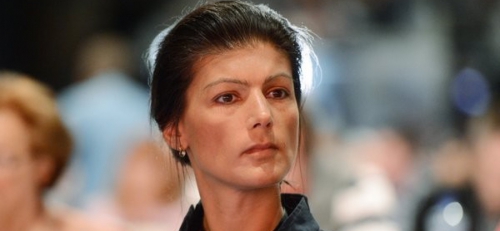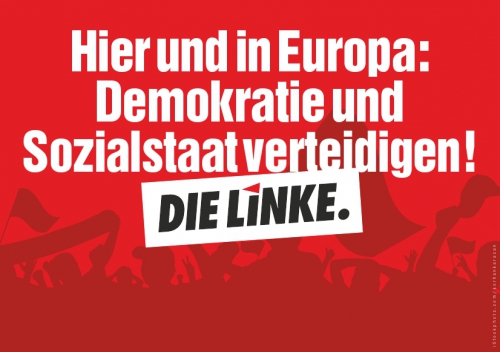« Le pouvoir réside dans les infrastructures | Page d'accueil | Une précieuse odeur de vieux temps »
jeudi, 02 juin 2016
German Left Party's Geopolitical Split

On the 28th-29th May in the German city of Magdeburg, the party congress of the German “Left Party” (die Linke) was held. Representatives of one of the largest German opposition parties elected the leadership and discussed plans for the development of the party in the period before the parliamentary elections to be held in 2017. As was expected, the party leadership was re-elected. Katja Kipping and Bernd Riexinger were re-elected as co-chairs of the party. However, the latest events showed that they could not manage the challenges of last year, as the popularity of the party dropped significantly in its stronghold – Eastern Germany. The congress also highlighted the internal split within the party caused by its stance on migrants and the possibility of a broader coalition with other left-wing parties.
The Left Party as a political phenomenon
The "Left Party" was formed originally from the Social Democratic Party of Germany and representatives of the popular in East Germany Party of Democratic Socialism - the successor to the Socialist Unity Party of Germany, the ruling party of the GDR. In the last election in 2013, the party won 8.6% of the vote, thus taking 64 out of 630 seats in the Bundestag.
From the outset, the party united rather disparate forces: the old left, raised in Marxist-Leninist spirit in East Germany, the "reformed" East German left (the most typical example - Gregor Gysi), "New Left" and the radical left in West Germany, and the Electoral Alternative for Labour and Social Justice (WASG), a party largely consisting of dissident Social Democrats, trade union members, headed (not officially) by Oskar Lafontaine, former German Minister of Finance in 1998-1999. Lafontaine, German sovereigntist and a fan of Friedrich List, who also positioned himself against the country to attract foreign labor because it harmed the interests of the German workers, seriously endorsed the Party from an electoral point of view. However, this has caused the "Left Party" to be criticized by the left-wing radicals and those for whom there was no principled defense of the interests of the German working class but the protection of minority interests and the attraction of migrants.
Refugee crisis and its aftermath
In 2015, the refugee crisis in Germany brought the old differences to the fore. Lafontaine’s spouse and head of the parliamentary faction of the Left Party in the Bundestag Sarah Wagenknecht cautiously opposed the policy of an unlimited acceptance of migrants. After the New Year's Eve sexual assaults in Cologne in January, Wagenknecht declared, "Whoever abuses their guest's rights has also forfeited their guest's rights." In March she gave an interview to the "Berliner Kurier", where she modestly dared to say, "Not all refugees can come". "We cannot take one million or more refugees each year," she said. That was enough to ensure that the representatives of the radical left within the party started to harshly criticize Wagenknecht. And at the party conference in Magdeburg, radical left "anti-fascists" were distinguished by the fact that they even threw a cake at her. They had earlier made the same boorish act in relation to a female MEP from right party "Alternative for Germany” Beatrix von Storch.
The migration crisis and the slurred position of the party on migrants (leadership has tried to dissociate itself from the statements of Sarah Wagenknecht) dealt a serious blow to the positions of the party in East Germany. Thus, according to recent opinion polls, the Christian Democratic Party (CDU) and its Bavarian sister party - the Christian Social Union - polled at 30.5%, and the Social Democratic Party (SPD) had 19.5%. Third place was claimed by the party of eurosceptics "Alternative for Germany", which is supported by 15% of Germans. "Green" received only 13%, and the "Left Party" - only 10%. The leadership of the Left Party recognizes that "Alternative for Germany" took their part of the electorate. Former left party parliamentary leader Gregor Gysi, in a recent interview for RND network, declared that he was "shocked that the poor, disenfranchised workers are voting, we're no longer the protest party in the East - more in the West ", he said. AfD took the position of the largest opposition party of East Germany. The reason for the outflow of the "Left" electorate is clear – the pro-migrant position of the party’s leadership - but instead, to correct their previous mistakes, it is ready to turn the party into an instrument of political intrigues, whose main goal is to isolate the increasingly popular "Alternative for Germany."
Anti-AfD strategy
The Left Party's organ - Neues Deutschland - started a campaign for promotion of forming leftist coalition with SPD and Greens against the "fascist" AfD. One of the main promoters of this idea within the Left Party is Gregor Gysi. Paradoxically the party alliance with left-liberal parties was called "Strategies against the trend of the right". Trotskyist groups affiliated with the Left Party Marx 21, Socialist Alternative (SAV) and Revolutionary Internationalist Organization (RIO) even advocated an alliance with the Christian Democratic Union and Christian Social Union to stop the AfD. The Party’s leadership, particularly Katja Kipping and Bernd Riexinger, share the idea of a broad coalition. Sarah Wagenknecht, in turn, opposes this path.
"A common chancellor candidate with parties who still stand for dismantling the welfare state, poverty pensions, precarious jobs, TTIP, and weapons exports to war zones - that really would make the Left arrowless and feeble", she declared in interview for "WAZ" media group. On Party's Congress she blamed current coalition for its neoliberal policies and once again rejected the idea of anti-AfD coalition.

Geopolitical split
Thus we see that there are two lines with respect to the party position in the new environment within the Left Party leadership. On the one hand, Sarah Wagenknecht, old left, who openly sympathizes to Soviet and Eastern German "real socialism", pronounced against an alliance with left-liberal parties, who follow Atlanticist pro-American agenda. At the same time, she, like her husband, opposes unrestricted migration, because it is a tool of global capital used to undermine the position of native forcing class by creating a new reserve army of low-paid workers. In the case of the Lafontaine- Wagenknecht couple we see the union of the old Soviet "Stalinist" left and sovereigntist part of European Social Democracy on the personal and political levels. The Continentalist geopolitical orientation, anti-globalist stance, and the desire to protect the interests of German workers make this part of the left closer to Continentalist right-wing Eurosceptics, especially AfD.
On the other hand we see the supporters of the alliance "the East German reconstruction" (Gregor Gysi), libertarian left (Katja Kipping) and Trotskyites with establishment parties against AfD. The special attention of this alliance should be paid to the Greens, who represent a political movement that shares the emancipatory agenda of post-1968 left (Cultural Marxism), but totally lacks the ideas of protection of working class interests. In fact, all these new leftists are more concerned about the protection of minorities than the promotion of the interests of the German workers, thus becoming the most aggressive part of the liberals, promoting the same vicious globalist agenda. They want to not only outcast the AfD - they want to destroy any alternative for Germany, destroying the Left Party as a party of the German working class and reshaping it into a more leftist European, Soros-funded, migrant-loving pro-sodomy puppet gang of left-liberal doctrinaires. A victory of this line makes the displacement of Sarah Wagenknecht from the leading position of the party a matter of time. If she fails to find a partner for the anti-globalist fight, she and her supporters will be marginalized.
The most frightening scenario for the establishment and German globalists would be a unity, maybe not formal, but a deep and essential, mutual understanding and support between representatives of the left and right Continentalists. Then they would have a chance to resist the globalist coalitions together. Naturally, the globalists will try to prevent this by putting pressure on Sarah Wagenknecht and her supporters "from the left and on the AfD leader Frauke Petry - "from the Right. "
00:05 Publié dans Actualité, Affaires européennes, Politique | Lien permanent | Commentaires (0) | Tags : politique internationale, politique, actualité, europe, allemagne, affaires européennes, géopolitique, gauche, gauche allemande, die linke, sarah wagenknecht |  |
|  del.icio.us |
del.icio.us |  |
|  Digg |
Digg | ![]() Facebook
Facebook



Les commentaires sont fermés.